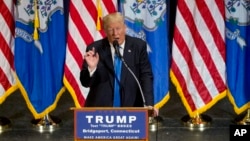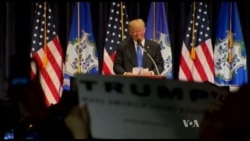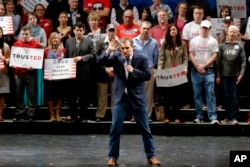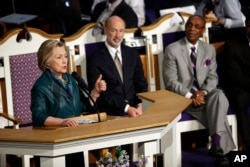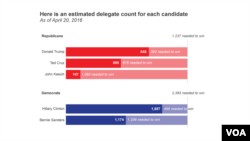Billionaire real estate mogul Donald Trump, trying to lock down the U.S. Republican presidential nomination, said he continues to believe in his anti-immigrant proposals, even as questions emerge about his authenticity.
One of his key campaign aides, Paul Manafort, told party leaders last week that Trump has been playing "a part" in the campaign and that he is "evolving" into a more traditional presidential candidate.
But the brash Trump assured a rally of cheering supporters in Connecticut Saturday that he has no intention of abandoning his proposals to temporarily keep Muslims out of the United States and to build a wall to block immigrants from streaming into the United States from Mexico.
"You know, being presidential's easy -- much easier than what I have to do," said Trump, a one-time television reality show host who has never held elective office. "Here, I have to rant and rave. I have to keep you people going. Otherwise you're going to fall asleep on me, right?"
He assured the crowd, "Everything I say I'm going to do, folks, I'll do."
His chief rival for the nomination, Texas Senator Ted Cruz, said Manafort's admission to the party's leaders at a conference in Florida prove that Trump's public pronouncements are "just a show. This is just a lie. Donald is telling us he's lying to us. Trump is a phony."
Five states vote
The two rivals face off in more nominating contests on Tuesday, in the northeastern states of Connecticut, Delaware, Maryland, Rhode Island and Pennsylvania.
Pre-election surveys show Trump is favored to win in all five states as he attempts to move closer to winning enough delegates to the party's July national convention to clinch the nomination before the quadrennial gathering opens.
Trump has a significant lead in the chase for convention delegates, but most of them are only pledged to vote for him on the first ballot.
If Trump does not secure the nomination then by reaching the required 1,237 majority of convention delegates, many of his delegates could switch their allegiance to Cruz or a third candidate in the race, Ohio Governor John Kasich, on subsequent ballots.
Cruz has acknowledged that he won't reach the 1,237 figure before the convention, but says that neither will Trump.
Cruz has outmaneuvered Trump in securing pledges from many convention delegates to vote for him beyond the first ballot and now is focusing his campaign efforts to keep the New York developer from reaching a first ballot majority.
Cruz, a firebrand conservative in the halls of Congress in Washington, won pledges of second-ballot support from at least 65 of the 94 convention delegates selected Saturday in several states. But Cruz's effort would be for naught if the nomination battle with Trump doesn't reach a second ballot.
Numerous Republican officials voice the fear that Trump would badly lose November's national election to the likely Democratic nominee, former U.S. Secretary of State Hillary Clinton.
Numerous national political surveys show Clinton, seeking to become the first female U.S. president, well ahead in a hypothetical face-off against Trump.
Some prominent Republicans also question Trump's philosophical views, expressing doubts whether he is the conservative he says he is on a variety of social issues, including abortion and health care, where he held more liberal views in years past.
One prominent Republican donor, industrialist Charles Koch, said Sunday "it's possible" that Clinton is preferable to a Republican in the national election.
Clinton holds a significant lead over her sole challenger, Vermont Senator Bernie Sanders, in the race for the Democratic nomination, but has yet to clinch it.
She is favored in all five of the states voting Tuesday.




